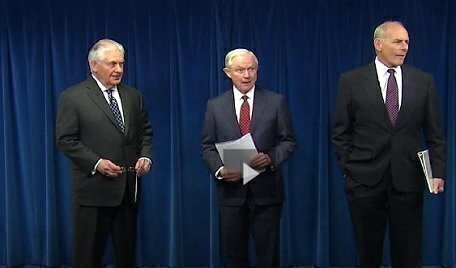President Donald Trump’s significantly revised immigration ban executive order has narrowed the types of immigrants and foreign nationals subject to a travel ban, but also eliminated earlier language about newcomers supporting the Constitution and founding principles.
 The original executive order was signed on January 27, 2017 and replaced by the second order, signed on March 6, 2017. Missing from the new order was a paragraph in the January 27 order, in a section called Purposes, that said potential immigrants shouldn’t be admitted to the United States if they opposed the country’s Constitution.
The original executive order was signed on January 27, 2017 and replaced by the second order, signed on March 6, 2017. Missing from the new order was a paragraph in the January 27 order, in a section called Purposes, that said potential immigrants shouldn’t be admitted to the United States if they opposed the country’s Constitution.“In order to protect Americans, the United States must ensure that those admitted to this country do not bear hostile attitudes toward it and its founding principles. The United States cannot, and should not, admit those who do not support the Constitution, or those who would place violent ideologies over American law,” the original order said. “In addition, the United States should not admit those who engage in acts of bigotry or hatred (including 'honor' killings, other forms of violence against women, or the persecution of those who practice religions different from their own) or those who would oppress Americans of any race, gender, or sexual orientation.”
The original order’s Purposes section also focused on post-9/11 terror instances caused by “foreign nationals who entered the United States after receiving visitor, student, or employment visas, or who entered through the United States refugee resettlement program.”
The new order’s Purposes section focuses on arguments about six Middle Eastern countries (excluding Iraq) lacking adequate screening processes for its immigrants to the United States and the constitutional ability of the President under immigration law to “as he shall deem necessary, suspend the entry of all aliens or any class of aliens as immigrants or nonimmigrants, or impose on the entry of aliens any restrictions he may deem to be appropriate."
But it does contain a reference to publicizing “acts of gender-based violence against women, including so-called ‘honor killings,’ in the United States by foreign nationals” as well as publicizing "information regarding the number of foreign nationals in the United States who have been charged with terrorism-related offenses while in the United States."
In all, the new order adds more classes of people directly exempt from temporary immigration bans, provides for case-by-case waivers and gives people affected by the ban 10 days' notice before the ban’s provisions go into effect on March 16. The order also recognizes that all green-card holders, dual citizens and current valid visa holders are exempt from the travel ban, and Syrian nationals are included in a 120-day refugee ban.
It is also clear that the new order was crafted to counter arguments in several federal courts that the original ban’s intent was to target Muslim-majority countries.
“That order was not motivated by animus toward any religion, but was instead intended to protect the ability of religious minorities -- whoever they are and wherever they reside -- to avail themselves of [refugee programs] in light of their particular challenges and circumstances,” the new order reads.
With the new order signed, more legal challenges are expected. The American Civil Liberties Union said on Monday it will contest the new order. “"The Trump administration has conceded that its original Muslim ban was indefensible. Unfortunately, it has replaced it with a scaled-back version that shares the same fatal flaws," said Omar Jadwat, director of the ACLU’s Immigrants’ Rights Project. "The only way to actually fix the Muslim ban is not to have a Muslim ban.”
Cases in the Ninth Circuit and other courts could also be altered by the new executive order.
Scott Bomboy is the editor in chief of the National Constitution Center.Recent Constitution Daily Stories
The Constitution and the federal budget processCourt gives new guidance on racial gerrymanderingTransgender rights ruling put off





